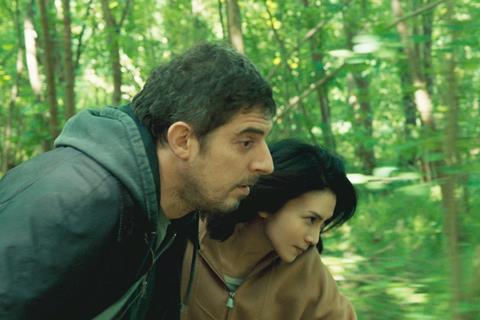Kiyoshi Kurosawa updates his 1998 crime thriller and moves the action from Tokyo to France

Dir. Kiyoshi Kurosawa. France/Belgium/Luxembourg/Japan 2024. 113mins
Recent film history has not been kind to directors who remake their own work in different languages: think of Michael Haneke’s Funny Games and George Sluizer’s The Vanishing, both significantly drained of meaning in their US versions. One thing that can be said for revenge thriller Serpent’s Path, by Japanese genre maestro Kiyoshi Kurosawa, is that its French remodelling stands coherently enough on its own terms, although the result is a murky, over-extended affair.
The remake touches on human pain in a way that the original, distanced by genre formalism, does not
Based on Kurosawa’s 1998 Serpent’s Path, a low-budgeter he shot back to back with Eyes Of The Spider, this version, which was released in Japan in June, is a more deliberately-crafted prestige affair starring major names of Japanese and French cinema. Yet it goes through its grim tragi-farce moves rather mechanically, pulling the viewer’s strings in a way that is hardly unpredictable. Kurosawa fans and lovers of Japanese genre will gravitate to it more readily than, say, admirers of the film’s French stars Damien Bonnard and Mathieu Amalric.
This follows closely on the Venice debut of Kurasawa’s Japanese title Cloud, now the country’s official Oscar nomination. It sees the director return to France eight years after his low-key romantic chiller Daguerrotype, in which Amalric also starred. Here, Albert Bacheret (a brooding Bonnard) is determined to punish those responsible for the sadistic murder of his young daughter. Albert is abetted by Sayoko Nijima (Ko Shibasaki), a therapist who approaches him in the hospital where he is having treatment for trauma.
Effectively masterminding the scheme, she assists Albert in kidnapping Laval (Amalric), an accountant for a foundation that supposedly runs orphanages but allegedly has a more ruthless agenda. Chained up and ruthlessly mistreated by Albert and Sayoko, Laval points the finger at a corporate high-up (Claire Denis regular Grégoire Colin), who soon also finds himself imprisoned by Laval’s side. As the mission intensifies, blood is spilled and further individuals are drawn in, who may be guilty, innocent or indirectly implicated – it’s hard to draw clear distinctions.
But why is Sayoko involved? We see her at her Paris home, avoiding calls from her estranged partner, and at work, treating Yoshimura (Drive My Car star Hidetoshi Nishijima), a man profoundly depressed by living in France. Sayoko clearly feels a similar exile’s unease, but Kurosawa keeps us guessing about what’s on her mind – although one captive, fixed by her implacable gaze, identifies her as the ‘serpent’ of the title.
The 1998 film was a spare chamber piece largely set in a barren industrial space – an archetypal ‘Abandoned Warehouse’ thriller of which Reservoir Dogs is the best known example. It was also a relatively straightforward yakuza drama; the remake expands the premise by introducing a female lead depicted very much as this story’s mysterious ‘other’. The icy composure exuded by chicly-dressed singer-actor Shibasaki (best known outside Japan for One Missed Call and 47 Ronin) may suggest a European stereotype of Asian ruthlessness. But by keeping Sayoko’s inner nature so tightly under wraps, Kurosawa reverses the stakes, making European violence – and corporate complicity in it – the outright horror.
One thing that made the original effective – and indeed, bearable to watch – was its diagrammatic starkness as a minimalist pulp exercise. Here, the ‘Theatre of Cruelty’ aspect is harder to swallow, not least because it is so clear from the start that Albert has become as much a monster as those who caused his pain. To some degree, this is a surprisingly faithful revision of the original, even down to a copy of the original’s most macabre shot, which here registers even more as heightened Grand Guignol. The addition of hints about Sayoko’s psyche and back story bring more of a human touch, but that is precisely what makes for uncomfortable watching – the remake touches on human pain in a way that the original, distanced by genre formalism, does not.
Production companies: Cinefrance Studios, Tarantula, Kadokawa Corporation
International sales: Kadokawa Corporation mori-c@kadokawa.jp
Producers: David Gauquire, Joseph Rouschop, Donato Rotunno, Takeo Kodera
Screenplay: Kiyoshi Kurosawa, Aurélien Ferenczi
Cinematography: Alexis Kavyrchine
Production design: Nicolas Flipo
Editing: Thomas Marchand
Music: Nicolas Errèra
Main cast: Ko Shibasaki, Damien Bonnard, Mathieu Amalric, Hidetoshi Nishijima























